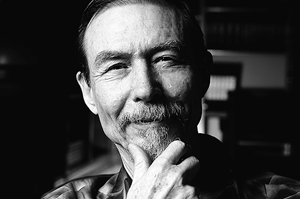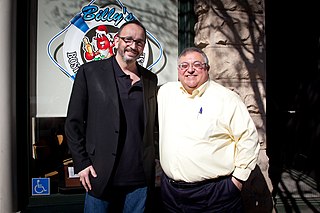
John Kenneth Ousterhout is an American computer scientist. He is a professor of computer science at Stanford University. He founded Electric Cloud with John Graham-Cumming.

Carver Andress Mead is an American scientist and engineer. He currently holds the position of Gordon and Betty Moore Professor Emeritus of Engineering and Applied Science at the California Institute of Technology (Caltech), having taught there for over 40 years.

Isaac Robert "Ike" Nassi, born 1949 in Brooklyn, New York, is the founder, and former CTO and chairman at TidalScale, Inc. before its acquisition by HPE, and an adjunct professor of Computer Science at the University of California, Santa Cruz. He is known for creating the highly influential Nassi–Shneiderman diagram notation. He also helped design the Ada programming language.

Denice Dee Denton was an American professor of electrical engineering and academic administrator. She was the ninth chancellor of the University of California, Santa Cruz.

The Fannie and John Hertz Foundation is an American non-profit organization that awards prestigious fellowships to Ph.D. students in the applied physical, biological and engineering sciences. The fellowship provides students with up to $250,000 of support over five years, giving them flexibility and the ability to pursue their own interests, as well as mentoring from alumni fellows. Fellowship recipients pledge to make their skills available to the United States in times of national emergency.

Martin Karplus is an Austrian and American theoretical chemist. He is the Director of the Biophysical Chemistry Laboratory, a joint laboratory between the French National Center for Scientific Research and the University of Strasbourg, France. He is also the Theodore William Richards Professor of Chemistry, emeritus at Harvard University. Karplus received the 2013 Nobel Prize in Chemistry, together with Michael Levitt and Arieh Warshel, for "the development of multiscale models for complex chemical systems".

Harry L. "Nick" Tredennick was an American manager, inventor, VLSI design engineer and author who was involved in the development for Motorola's MC68000 and for IBM's Micro/370 microprocessors. He held BSEE and MSEE degrees from Texas Tech University, and a Ph.D. in Electrical Engineering from the University of Texas at Austin. Tredennick was named a Fellow of the IEEE; the citation reads "For the design and implementation of the execution unit and controller of the MC68000 workstation microprocessor".

David Baker is an American biochemist and computational biologist who has pioneered methods to predict and design the three-dimensional structures of proteins. He is the Henrietta and Aubrey Davis Endowed Professor in Biochemistry and an adjunct professor of genome sciences, bioengineering, chemical engineering, computer science, and physics at the University of Washington. He serves as the director of the Rosetta Commons, a consortium of labs and researchers that develop biomolecular structure prediction and design software. The problem of protein structure prediction to which Baker has contributed significantly has now been largely solved by DeepMind using artificial intelligence. Baker is a Howard Hughes Medical Institute investigator and a member of the United States National Academy of Sciences. He is also the director of the University of Washington's Institute for Protein Design.

John Kuriyan is the dean of basic sciences and a professor of biochemistry at Vanderbilt University School of Medicine. He was formerly the Chancellor's Professor at the University of California, Berkeley in the departments of molecular and cell biology (MCB) and chemistry, a faculty scientist in Berkeley Lab's physical biosciences division, and a Howard Hughes Medical Institute investigator. He is a member of the National Academy of Sciences and he has also been on the Life Sciences jury for the Infosys Prize in 2009, 2019 and 2020.

Arieh Warshel is an Israeli-American biochemist and biophysicist. He is a pioneer in computational studies on functional properties of biological molecules, Distinguished Professor of Chemistry and Biochemistry, and holds the Dana and David Dornsife Chair in Chemistry at the University of Southern California. He received the 2013 Nobel Prize in Chemistry, together with Michael Levitt and Martin Karplus for "the development of multiscale models for complex chemical systems".

Kurt Mehlhorn is a German theoretical computer scientist. He has been a vice president of the Max Planck Society and is director of the Max Planck Institute for Computer Science.
Anders Krogh is a bioinformatician at the University of Copenhagen, where he leads the university's bioinformatics center. He is known for his pioneering work on the use of hidden Markov models in bioinformatics, and is co-author of a widely used textbook in bioinformatics. In addition, he also co-authored one of the early textbooks on neural networks. His current research interests include promoter analysis, non-coding RNA, gene prediction and protein structure prediction.

S. Shankar Sastry is the Founding Chancellor of the Plaksha University, Mohali and a former Dean of Engineering at University of California, Berkeley.
Sung-Mo "Steve" Kang is an American electrical engineering scientist, professor, writer, inventor, entrepreneur and 15th president of KAIST. Kang was appointed as the second chancellor of the University of California, Merced in 2007. He was the first department head of foreign origin at the electrical and computer engineering department at the University of Illinois at Urbana-Champaign and Dean of the Baskin School of Engineering at UC Santa Cruz. Kang teaches and has written extensively in the field of computer-aided design for electronic circuits and systems; he is recognized and respected worldwide for his outstanding research contributions. Kang has led the development of the world’s first 32-bit microprocessor chips as a technical supervisor at AT&T Bell Laboratories and designed satellite-based private communication networks as a member of technical staff. Kang holds 15 U.S. patents and has won numerous awards for his ground breaking achievements in the field of electrical engineering.
Harry F. Noller is an American biochemist, and since 1992 the director of the University of California, Santa Cruz's Center for the Molecular Biology of RNA. He has made significant contributions to our understanding of the ribosome and is a member of the National Academy of Sciences.
Rod Diridon Sr. is an American politician known for his leadership in mass transportation. He served as chair of the California High-Speed Rail Authority from 2001 to 2003. He currently chairs the advisory board of the United States High Speed Rail Association, and he chairs the National Heritage Area Project for Santa Clara County, California. The New York Times calls Diridon "a tireless advocate of public transport for the Bay Area."

Lise Getoor is an American computer scientist who is a distinguished professor and Baskin Endowed chair in the Computer Science and Engineering department, at the University of California, Santa Cruz, and an adjunct professor in the Computer Science Department at the University of Maryland, College Park. Her primary research interests are in machine learning and reasoning with uncertainty, applied to graphs and structured data. She also works in data integration, social network analysis and visual analytics. She has edited a book on Statistical relational learning that is a main reference in this domain. She has published many highly cited papers in academic journals and conference proceedings. She has also served as action editor for the Machine Learning Journal, JAIR associate editor, and TKDD associate editor.

Massoud Pedram is an Iranian American computer engineer noted for his research in green computing, energy storage systems, low-power electronics and design, electronic design automation and quantum computing. In the early 1990s, Pedram pioneered an approach to designing VLSI circuits that considered physical effects during logic synthesis. He named this approach layout-driven logic synthesis, which was subsequently called physical synthesis and incorporated into the standard EDA design flows. Pedram's early work on this subject became a significant prior art reference in a litigation between Synopsys Inc. and Magma Design Automation.
Kimmen Sjölander is professor emerita at the University of California, Berkeley in the Department of Bioengineering. She is well known for her work on protein sequence analysis.
Barry H. Honig is an American biochemist, molecular biophysicist, and computational biophysicist, who develops theoretical methods and computer software for "analyzing the structure and function of biological macromolecules."













